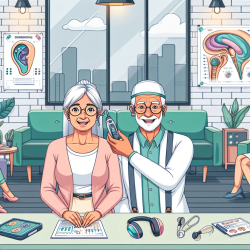At TinyEYE, our mission is to deliver exceptional online therapy services to schools, ensuring that every child receives the best possible support. Today, we're diving into a crucial area of professional development: enhancing practitioner skills through evidence-based insights. We'll be exploring key findings from the research article titled "Intellectual disabilities teaching for medical students: a scoping review" and how you can leverage these insights to improve your practice.
Key Findings from the Research
The scoping review, conducted by Towson, Daley, and Banerjee, evaluated various educational interventions on intellectual disabilities for medical students. The study included a comprehensive analysis of 16 studies, identifying different intervention types such as:
- Classroom-based teaching
- Simulation
- Placement
- Home visits
- Panel discussions
One significant finding was the substantial variation in content and learning outcomes, making it challenging to assess overall effectiveness. The review highlighted the need for more consistent intervention design and higher quality evaluations.
Implementing Research Outcomes to Enhance Practitioner Skills
Here are actionable steps practitioners can take based on the research findings:
1. Incorporate Lived Experience in Training
The review found that most effective interventions included input from individuals with lived experiences of intellectual disabilities. This approach can provide a more realistic and impactful learning experience for practitioners.
2. Utilize Simulation-Based Learning
Simulations with standardized patients were shown to improve comfort and communication skills significantly. Incorporating these into training programs can enhance practitioners' abilities to interact effectively with individuals with intellectual disabilities.
3. Emphasize Reflective Practice
Encouraging reflective practice through qualitative feedback and self-assessment can help practitioners develop a deeper understanding and professional identity. This approach fosters continuous improvement and personal growth.
4. Standardize Training Modules
Consistency in training content and delivery methods is crucial. Developing standardized modules that cover essential knowledge and skills can ensure that all practitioners receive comprehensive and effective training.
Encouraging Further Research
The review also highlighted the need for ongoing research to update and refine educational interventions. Practitioners are encouraged to engage in further research to explore new methods and evaluate the effectiveness of existing ones. By contributing to the body of knowledge, we can collectively improve outcomes for individuals with intellectual disabilities.
To read the original research paper, please follow this link: Intellectual disabilities teaching for medical students: a scoping review.
By implementing these research-backed strategies, practitioners can enhance their skills and provide better support to individuals with intellectual disabilities. Together, we can create a more inclusive and effective healthcare environment.










